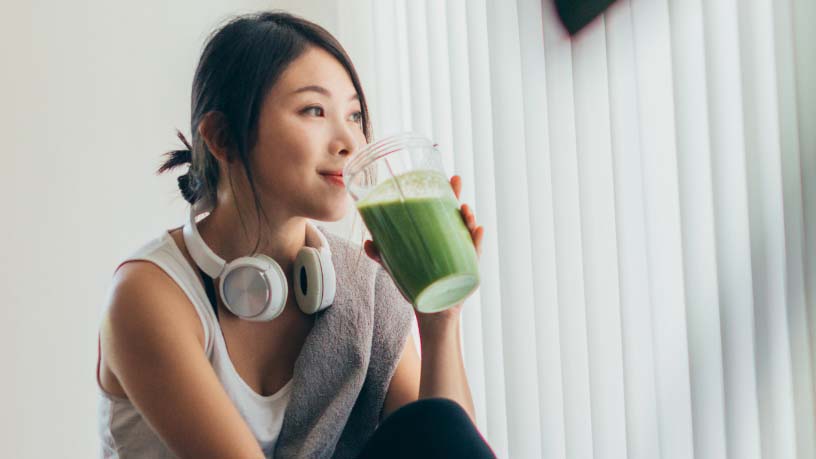Don’t assume all plant-based foods are healthier options. Check labels and watch for high sugar and salt content in processed foods.
On this page
Key takeaways
A plant-based diet can help reduce your risk of some serious conditions such as heart disease and some cancers.
Consult a GP before starting any new diet or eating plan.
Food trends come and go but eating more plants and less meat might be one that’s here to stay.
According to 2018 research, nearly 2.5 million Australians ate all, or almost all, vegetarian food.1 This means most (or all) of their food is from plants, such as vegetables, fruit, grains, legumes, nuts and seeds. Of these, about 500,000 people are vegan.
Now more than ever, it’s easier to shop and consume plant-based foods. Supermarkets have seen a surge in the popularity of plant-based and vegan products, particularly meat alternatives and ready-to-go meals. But does going green-er mean healthier? We spoke with Bupa Dietitian Jacqueline Li to get the low-down on the popular trend.
What is a plant-based diet?
Following a plant-based diet is about making plants the hero of your dish, but it doesn’t have to be plant-exclusive. Vegetables do play a huge part, but equally so do wholegrains, legumes, nuts, seeds and fruits. And if you’re craving a meat lover's pizza, it also offers the flexibility to enjoy these foods in moderation.
“A plant-based diet is a general term given to a pattern of eating where the individual will largely source their nutrition from foods with a plant origin, however this does not totally exclude animal-based meats,” says Li. “Some people may still choose to include small to moderate amounts of animal products.”
Examples of plant-based diets include, but are certainly not limited to, vegetarian and vegan diets.
Is a vegetarian diet different?
Typically, meat, poultry, fish and shellfish will be excluded in a vegetarian diet.
“The term ‘vegetarian diet’ is an umbrella term for the many different subtypes of vegetarian diets,” says Li.
“At large, all vegetarian diets aim to prioritise foods that come from plant sources while limiting animal-based foods, such as meat, dairy and eggs.”
Some different subtypes include:
- Ovo-vegetarian. This excludes meat, poultry, seafood and dairy, but includes eggs (‘ovo’ means egg)
- Lacto-vegetarian. This excludes meat, poultry, seafood and eggs, but includes dairy products (‘lacto’ means milk)
- Lacto-ovo-vegetarian. This excludes meat, poultry and seafood, but includes eggs and dairy products
- Pescetarian. This excludes meat or poultry, but includes fish and seafood, eggs and dairy
- Vegan. This means you don’t eat any animal products or by-products.
What are the benefits of eating a plant-based diet?
There are many reasons you may choose to go plant-based including animal welfare, ethical or environmental reasons.
Health is a big drawcard. Research proves there are many benefits to a plant-filled diet, including improvements to metabolic measures such as blood pressure, cholesterol and blood sugar.2
Eating plant-based will:
- Lower red meat intake. As a nation, Australians are eating more than the maximum recommended 455 grams of cooked red meat per week, increasing bowel cancer risk. Switching from red meat to a plant-based source of protein like tofu, legumes, lentils, nuts and seeds can reduce this risk
- Reduce saturated fat. Meat products including red meat and poultry are often higher in saturated fat compared to plant-based protein options. Lowering your saturated fat intake is a good place to start if you want to reduce your cholesterol levels.
- Increase fibre. When you eat more vegetables, fruit, and grains, and get your protein from foods like lentils, beans, seeds and nuts, you’ll naturally see an increase in your daily fibre intake. A higher fibre diet is associated with a healthy digestive system and a diverse gut microbiome.
Research suggests a plant-based diet (specifically vegetarian with no processed foods) can help with weight loss and reduce the risk of obesity.3 It’s also said to help lower ‘bad’ LDL cholesterol levels4 and blood pressure, decreasing the risk of developing coronary heart disease, high blood pressure and type 2 diabetes5.
One large study revealed that those who followed a plant-based diet had a significantly lower risk of developing heart disease than those who didn’t.6 The study also found that those who ate a less-healthy plant-based diet which included processed foods such as sugary drinks, refined grains and fruit juices were at a slightly increased risk of developing heart disease.
Studies also suggest that eating plenty of fruit and vegetables may help reduce the risk of developing some cancers compared to non-plant-based diets.7
Is everything plant-based good for you?
Beware plant-based foods being promoted to you as healthy, as they might not always be the best option.8
“The term ‘plant-based’ certainly has a healthy ring to it, but it doesn’t mean that all plant-based foods are as nutritious as one may think,” says Li.
“Some desserts and discretionary items, while being plant based (containing no animal products) may still contain high amounts of added sugar, fat and/or salt. Examples include dairy-free sorbets, chips, lollies and some biscuits, to name a few.”
“The focus should be on choosing wholefoods ([such as] fruit and vegetables) and products that are less processed, and to limit options that have too much fat, sugar and/or salt added,” says Li.
It’s a good idea to always check product labels for a full list of ingredients, particularly sugar, salt and fat content. The FoodSwitch app9 is a great tool to help you make better food choices by providing health and nutrition information.
Member Health Programs
Discover health cover that's right for you with a range of personalised programs and services designed to support your health and wellbeing.
How can you get the most out of eating a plant-based diet?
When you cut out food groups it's important you're still meeting your daily nutrient needs. Planning is important for every kind of diet, plant-based or not.
Just like with a traditional diet, protein should remain an essential to all meals. Once you have that covered, you can fill the rest of your plate with fruit, vegetables, wholegrains and other plant-based nutrients.
For most people the recommended daily intake (RDI) for protein is between 0.75 and 0.85 grams of protein per kilogram of body weight.10 Younger and older age groups require more.
Dietary sources for nutrients that might be low in plant-based diets are:
- Protein: grains, lentils and legumes, beans, nuts, seeds, tofu, tempeh, seitan, quinoa and soy yoghurt
- Iron: legumes, beans, grains, nuts, seeds and dark leafy greens
- Zinc: beans, nuts, pumpkin seeds, tofu, tempeh, oats, wholegrain breads and cereals, and nutritional yeast
- Vitamin D: safe sunlight exposure
- Iodine: seaweed, iodised salt, bread (not organic), cranberries and prunes
- Vitamin B12: supplements, nutritional yeast and fortified foods (for example, some breads or cereals), with smaller amounts found in nori and shiitake mushrooms
- Omega-3 fats: seaweed, algae, flax seeds, canola oil, walnuts, chia seeds and hemp seeds
- Calcium: plant-based milks with at least 100 milligrams of calcium per 100 grams, edamame, sesame seeds, tahini, calcium-set tofu, broccoli and figs.
If you’re thinking of starting to follow a plant-based diet, speaking to your GP or an Accredited Practising Dietitian can ensure you do so in a way where you continue to meet your personal nutritional needs.

At Bupa, trust is everything
Our health and wellbeing information is regularly reviewed and maintained by a team of healthcare experts, to ensure its relevancy and accuracy. Everyone's health journey is unique and health outcomes vary from person to person.
This content is not a replacement for personalised and specific medical, healthcare, or other professional advice. If you have concerns about your health, see your doctor or other health professional.
1Roy Morgan. (2019). Rise in vegetarianism not halting the march of obesity [Press release].
2Medawar, E., Huhn, S., Villringer, A., & Witte, V. (2019). The effects of plant-based diets on the body and the brain: a systematic review. Translational Psychiatry, 9, 226.
3Huang, R. Y., Huang, C. C., Hu, F. B., Chavarro, J. E. (2016). Vegetarian Diets and Weight Reduction: a Meta-Analysis of Randomized Controlled Trials. Journal of General Internal Medicine, 31(1), 109-116.
4Stanford Medicine, Nutrition Studies Research Group. (2020). Effects of a Plant-Based Diet on Plasma Lipids. Stanford Medicine.
5Satija, A., Bhupathiraju, S. N., Rimm, E. B., Spiegelman, D., Chiuve, S. E., Borgi, L., Willett, W. C., Manson, J. E., Sun, Q., & Hu, F. B. (2016). Plant-Based Dietary Patterns and Incidence of Type 2 Diabetes in US Men and Women: Results from Three Prospective Cohort Studies. PLOS Medicine, 13(6), e1002039.
6Satija, A., Bhupathiraju, S. N., Spiegelman, D., Chiuve, S. E., Manson, J. E., Willett, W., Rexrode, K. M., Rimm, E. B., & Hu, F. B. (2017). Healthful and Unhealthful Plant-Based Diets and the Risk of Coronary Heart Disease in U.S. Adults. Journal of the American College of Cardiology, 70(4), 411-422.
You might also like...
Healthy breakfast ideas for people with food intolerances
Whether you’re avoiding dairy, gluten or even fructose due to intolerances, we’ve put together some easy breakfast ideas to help.
Do potatoes count as one of your 5 a day?
Hot chips, roast potatoes and a good old-fashioned creamy mash. Potatoes are vegetables, but are they healthy enough to count as one of your 5 a day?
Is it time to up your fibre intake?
Fibre can help prevent bowel problems and keep us feeling well, but most of us aren't eating enough. Are you?
Is intermittent fasting good for you?
We've been hearing a lot about intermittent fasting recently, so how does it work? And is it a healthy way to burn body fat?





